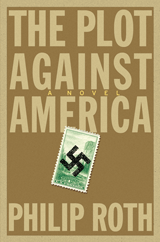This Land Was Your Land, This Land Was My Land
 Reviewed:
Reviewed:Philip Roth, The Plot Against America
Boston and New York: Houghton Mifflin, 2004. 391 pp. $26
1.
What if Charles Lindbergh had run for President of the United States in 1940 as the GOP candidate on an Isolationist platform, against Franklin Delano Roosevelt? Lindy might just have won: many shared the conviction of America First (a coalition founded by Yale students), the radio rabble-rouser Father Coughlin, the Silver Shirts, the KKK, the German-American Bund, and other groups, that America should stay out of a new war in Europe. There were others who felt that way and had no fascist leanings. They regarded the First World War as a senseless orgy of carnage we should never have entered, and didn't want American boys killed again. The popular song “Let them keep it over there,” an ironic reprise of the World War I “Over there, over there,” was written by Irving Berlin, an American Jew.
But the America Firsters & Co. arrived at their pacifism from entirely different convictions: Hitler, they believed, was fighting to save White Christian civilization from a worldwide conspiracy of Jews and Bolsheviks. The Nazis posed no threat to this country, they insisted; but the Jews and the agents of the British Empire were spreading malicious disinformation about Germany in order to drag America into the European conflict for their own selfish reasons. Lindbergh was a handsome young aviator whose solo flight to Paris in 1927 had made him a popular hero; and the kidnapping and murder of his son five years later added a nimbus of sorrow to his charisma. He was also an admirer of Hitler and an anti-Semite. The latter did not necessarily compromise the reputation of a public figure then.
In the America of my parents’ early youth (they were both born in Brooklyn in the year of the transatlantic crossing of The Spirit of St. Louis), there were lynchings and massacres of Blacks in the South and segregation everywhere. Hotels and restaurants displayed notices warning that only Gentile customers were welcome. Eugenics was respectable as theory and policy in the best university circles. President Lowell of Harvard had devised the numerus clauses system for Jews: Yale kept it till the early 1960's (according to the late Professor Harry Miskimin, Yale’s History Department only agreed to hire Jewish faculty in the 1960s “to compete better with Harvard”). President Nicholas Murray Butler of Columbia University visited Hitlerian Heidelberg and dismissed his critics as Communists. American athletes eagerly competed at the Nazi Olympics of 1936.
I knew a living fossil of the Berlin Olympics: she owned a bucolic guest ranch in Wyoming where I used to stay and ride in the summer through the 1990's. Betty was the granddaughter of the president of Yale, and had captained the US women's ski team at the 1936 Games. She had even dined with Hitler. (He was not a pleasant table companion, she recalled.) Other guests at the ranch had included the Nazi filmmaker Leni Riefenstahl, whose autographed memoirs I read in the comfortable den. Wealthy Germans who had settled of necessity in South America after the war were regular guests. One German residing in Maryland who, after his denazification, had spent the postwar years comfortably as an executive at Dupont, confided to me that during the war he designed bomb fuses for the Luftwaffe, which used slave labor at Katowice to make them. He estimated that he was responsible for the deaths of 25,000 Russian prisoners of war, give or take a few hundred. But, he mused, Russians weren't human. When I asked whether he thought Tolstoy and Dostoyevsky were, Bernie paused and admitted he'd never made that connection. The American-born guests were investment bankers and the like. The young teenage son of one couple from New York City used to tag along when I worked with the horses. To make conversation, I asked him where he wanted to go to high school. ”Dunno.” “How about Horace Mann?” “No, too many Jews.”
 Happiness is to be on horseback in Wyoming on a summer morning in a birch copse with the Indian Paintbrush blossoms
sparkling in the grass. But after the crucifixion-like murder near Laramie in 1997 of a beautiful young gay student,
Matthew Shepard, I decided I'd ridden one too many trails with folks who soft-pedaled the Holocaust, kept company
with war criminals, and told fudge-packer jokes. I've not been back to my friend’s ranch.
Happiness is to be on horseback in Wyoming on a summer morning in a birch copse with the Indian Paintbrush blossoms
sparkling in the grass. But after the crucifixion-like murder near Laramie in 1997 of a beautiful young gay student,
Matthew Shepard, I decided I'd ridden one too many trails with folks who soft-pedaled the Holocaust, kept company
with war criminals, and told fudge-packer jokes. I've not been back to my friend’s ranch.
With folks like me and Matt out of the picture, you've got, more or less, what America might have come to look like, had the Isolationist lobby succeeded. A cheerful, athletic, Judenrein society welcoming gemütlich German visitors, and of course no queers. It's not an altogether implausible scenario. Fortunately there was and is another America, but more on it anon.



This Land was Your Land:
A Review of Philip Roth
James Russell
Am I Religious?
Jay Michaelson
Down and Out in the Slipper Room
Joshua Axelrad
Tarnation: The Dream of Autobiography
Lauren Wilson
Money-Back Guarantee
Samantha Stiers
Sitting on an aeroplane, while Grandma Dies
Nigel Savage
Archive
Our 580 Back Pages
Zeek in Print
Fall/Winter 2004 issue now on sale
About Zeek
Mailing List
Contact Us
Subscribe
Tech Support
Links
From previous issues:
A Demonstration in Words
Hila Ratzabi
Schneiderman
Eliezer Sobel
On Eighth Avenue in New York
Jay Michaelson